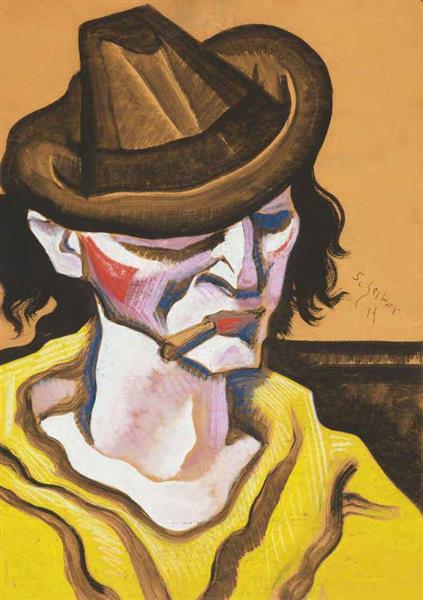Description
Hugó Scheiber, a Hungarian artist known for his avant -garde and expressionist style, presents a complex representation that captures the essence and spirit of urban life at the beginning of the 20th century. The painting, through a dynamic composition and a bold use of color, reflects the disturbing reality of those marginalized during a time of great social and economic transformations.
The central figure in "Vagabundo" is a man of Andrajosa appearance, with a countenance marked by the hardness of life in the street. The face, expressive and full of anguish, is delineated by a series of energetic strokes that manage to convey a sense of movement and despair. The choice of dark colors, combined with flashes of brighter tones, amplify the feeling of chaos and urgency.
Scheiber displays a masterful domain of geometry in the composition of the work. Angulous lines and fragmented forms not only give a modernist character to painting, but also suggest the fracture and disintegration of the vagabond life. These geometric elements are registered trademark of the artist's style, which often applies influences of futurism and cubism, integrating these currents into their own visual language.
The environment around the central character is more than defined suggestive, with barely allusions to an urban landscape that seems to blur in its drift. This contributes to a sense of isolation; The vagabon exists in an almost abstract space, which adds an additional layer of dislocation and loss to its already obvious despair. The technique of using a less elaborate fund with respect to the main figure highlights the latter, underlining its loneliness and suffering.
It is no accident that Scheiber chose to represent a vagabund. His work reflects a sensitivity towards the dispossessed and an interest in representing the harsh social reality of his time. The tramp is here a powerful symbol of what it is to be outside a society in transformation, an almost anonymous figure that, however, embodies a universal narrative of struggle and resistance.
Scheiber's art, meanwhile, has always been a testimony of the intersection of human lives with rapid technological and cultural changes. His ability to capture human emotions with such intensity and depth makes "vagabond" not only a significant painting of his work, but a penetrating comment about the state of humanity during a tumultuous era.
Thus, when contemplating "vagabond", we not only see a visual representation, but we are also invited to a reflection on history, culture and human condition. Hugó Scheiber, through its complex and technical evocative, offers us a mirror to carefully observe the harsh realities and the deep emotions that define human experience.
KUADROS ©, a famous paint on your wall.
Hand-made oil painting reproductions, with the quality of professional artists and the distinctive seal of KUADROS ©.
Art reproduction service with satisfaction guarantee. If you are not completely satisfied with the replica of your painting, we refund your money 100%.

